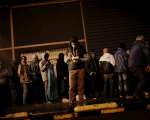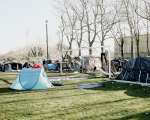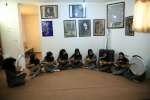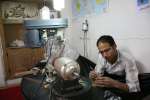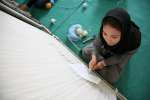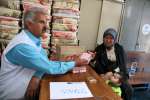Salman Khan lookalike fulfils dream in film epic mirroring real life
News Stories, 15 July 2015
NEW DELHI, India, July 15 (UNHCR) – Najeem Khan vividly remembers the first time his friends called him Salman Khan due to his striking resemblance to the Bollywood star who is one of Bollywood's biggest box office draws.
"We were standing in a market when suddenly one of my friends said that I looked just like Salman Khan. That day when I got back home, I looked myself in the mirror for hours. I was just 7 years old then," said Najeem, now 23, with a smile.
That day changed his life completely and gave the Afghan-born, Pakistan-bred refugee a dream to become a Bollywood actor like his idol.
But while growing up in Pakistan, Najeem had never imagined that one day his looks would launch his acting career in Bollywood and that in his first movie he would act alongside his hero Salman Khan, playing the role of a 'young Salman Khan.'
Due to his striking resemblance with actor Salman Khan, Najeem was selected for the role in Bajrangi Bhaijaan, a romantic drama about an Indian man who helps a mute Pakistani girl get home. Najeem in this movie "is playing a young and naughty Salman Khan in his late teens, who doesn't pay enough attention to his studies."
However in the real life, the two men's lives could not be more different – at least until now.
Unlike the 49-year-old Salman Khan, who was born into an influential family in Bollywood and is one of the most commercially successful actors ever in the Indian film industry, Najeem has had a tough life, a life full of struggles. A few months after his birth in Kabul, Afghanistan in 1992, his family had to flee to Islamabad, Pakistan, where he spent 16 years of his life.
"Bollywood movies were very popular in Pakistan and they still are," he said. "I have loved Bollywood since my childhood. In fact, when I was a child, I would dance and imitate Indian film actors. The growing comparison with Salman Khan further acted as a catalyst."
In 2007, he and his family moved back to Afghanistan but were forced to flee to India after spending only 20 days there due to escalating violence.
Once in India, there was no looking back. Najeem now resides in New Delhi with his mother and three brothers, who have been his great support.
"My face resembled to that of Salman Khan but not my body. So I started working on my physique and also learned acting and modelling," said the budding actor, who by 2012 had started getting modelling assignments and advertisement contracts. By this time he was even enjoying the nickname Salman Khan, and had started hogging some limelight.
"I look so much like Salman Khan, then I started walking and talking like him," he told UNHCR in an interview.
In refugee events organized by UNHCR's partners, Najeem dazzled fans with his sculpted body and quirky dance moves.
"I'm really grateful to UNHCR and its implementing partner BOSCO for its support and encouragement to showcase my talent at the refugee events which helped me to gain confidence and build a fan base."
Then came the big break. Director Kabir Khan was looking for someone who could play the young Salman Khan in the movie, Bajrangi Bhaijaan. When the director could not find anyone in the usual casting call, he took the search to social media.
"When I saw a post seeking actors on a social networking website, I went for an audition and soon I was in the cast. In November last year, I started shooting the movie in New Delhi."
For Najeem, finally it was a dream come true and when he met the real Salman Khan on the set of the movie, the actor hugged him.
"It was such an emotional moment for me. I can't even describe it in words. He has been my hero since childhood and there I was standing in front of him and then he hugged me," said Najeem.
"He congratulated me, told me to work harder and even offered me some helpful tips on body-building."
The movie is set to be released on July 17 to mark Eid – the official end of the holy month of Ramadan.
It is one of the most anticipated movies of the year. The film will be released in approximately 50 countries, including Pakistan, USA, UK and UAE among others.
Najeem is so excited that he can barely sleep these days. "I have been invited to the special screening of the movie. I hope people would love me playing the real Salman Khan."
By Shuchita Mehta in New Delhi, India














